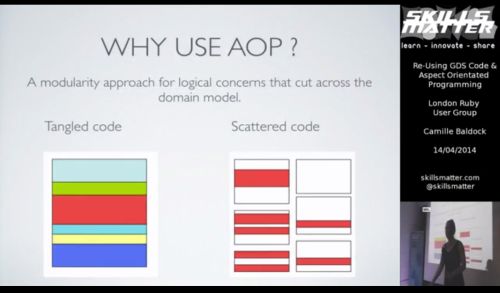Posts tagged with 'ruby'
Tim Wingfield is using lots of APIs. This episode is sponsored by Smartsheet.
Show Notes:
- FireEye
- Ruby on Rails
- REST: REpresentational State Transfer
- CRUD: Create, Read, Update, Delete
- HTTP Request Methods: PUT, POST, GET, PATCH, DELETE
Want to be on the next episode? You can! All you need is the willingness to talk about something technical.
Music is by Joe Ferg, check out more music on JoeFerg.com!
I blogged last year about my switch from Markdown to AsciiDoc, and that I was using AsciiDocFX.
I still like AsciiDoc, but AsciiDocFX has been getting on my nerves:
- It doesn't have a very good update system. It checks for new versions, but it seems like I have to a) uninstall the old version, b) reinstall the new version, otherwise I get problems. I may be doing it wrong, but this made me want to update less.
- The UI is a little wonky. The live preview sometimes seem to keep its update a few keystrokes behind, meaning that the preview and the document are out of sync. It also tends to get locked up, until I click the Restore button and then Maximize button.
Still, I used it.
But, I built a new computer this week. And I've been setting up my softwares on it. I thought it might be worthwhile to see if there's an AsciiDoc plugin for Visual Studio Code. And, of course there was, because apparently the Code extension ecosystem is booming!
So, I installed AsciiDoc by Joao Pinto, since it came with a live preview. But, it requires me to actually install the asciidoc command line tool.

See?
So, I thought, that should be easy enough. I went to the AsciiDoc site and started following the directions for Windows installation.
Install Ruby
Okay, well now I need to install Ruby. Should be easy enough. I already have Chocolatey NuGet, so I'll just run choco install ruby. No problem. I know that ruby comes with gem, so I should be all set.
Install AsciiDoc
According to AsciiDoc... docs... I just use gem install asciidoctor and that should do the trick.
But, no. It's not that easy. Otherwise I wouldn't be writing this blog. I got an error message:
SSL_connect returned=1 errno=0 state=SSLv3 read server certificate B: certificate verify failed
I'm sure all you Ruby people or Mac people or whatever already know where this is going, but I had no clue. So I googled it. I found a whole bunch of suggestions on StackOverflow. Some solutions made sense but weren't for Windows, and vice versa. I eventually hit upon some random guy's Gist and SSL upgrades on rubygems.org which lead to me this page on rubygems.org about SSL updates.
Fixing RubyGems Certificate Thingy
So, following that literally:
gem install --local C:\rubygems-update-2.6.7.gem
and then
update_rubygems --no-ri --no-rdoc
and finally
gem uninstall rubygems-update -x
So, I guess that fixed... something? It's described in the gist I linked above. But I don't really understand why it's still a problem for a brand new install of ruby. Not complaining! It worked!
Okay, now Install AsciiDoc
So now gem install asciidoctor works. And now I get a live preview of AsciiDoc in Visual Studio Code.

I'll report back after some more time blogging to see if I like this, or if I eventually go back to AsciiDocFx.
UPDATE: As of early April 2017, I've been blogging this way and I'm extremely happy with it. Visual Studio Code keeps getting better, the preview plugin keeps getting better. I've had to introduce a few tweaks in my process, but I've got the whole pipeline semi-automated. It's easy to bring in code samples (thanks to AsciiDoc), easy to post to both the Couchbase blog and this blog, easy to run Yoast on it, and so on. Some day I'll write a blog post explaining the whole process (and hopefully get some good suggestions for streamlining!)
Welcome to another "Weekly Concerns". This is a post-a-week series of interesting links, relevant to programming and programmers. You can check out previous Weekly Concerns posts in the archive.
- A platform to write apps in Ruby for ANY phone that uses SMS: Dumb Store.
- Password manager that doesn't actually store passwords: AnyHash.
- It took 54 years, but Xanadu is finally released as OpenXanadu.
- ECMAScript (aka the JavaScript spec) 6 is scheduled to be done by the end of this year. Of course, that doesn't really mean every browser will support every feature.
- Tetris was first created 30 years ago.
If you have an interesting link that you'd like to see in Weekly Concerns, leave a comment or contact me.
Welcome to another "Weekly Concerns". This is a post-a-week series of interesting links, relevant to programming and programmers. You can check out previous Weekly Concerns posts in the archive.
This is a special edition of Weekly Concerns, in that I'm attempting to cover the recent dust up over TDD that was triggered by DHH and responded to by several notable developer pundits. Note that I respect all of the developers in this conversation and I believe they are all making important points, but the way they communicate can be somewhat... abrasive... so make sure your jimmies are secure before you start reading.
- April 22: David Heinemeir Hansson's opening keynote at railsconf which lays the groundwork for...
- April 23: TDD is dead. Long live testing. by David Heinemeir Hansson.
- April 25: Monogamous TDD by Uncle Bob Martin.
- April 29: RIP TDD by Kent Beck
- April 29: Test-induced design damage by David Heinemeir Hansson.
- April 30: TDD, Straw Men, and Rhetoric by Gary Bernhardt. First DAS blog post in years.
- April 30: When TDD doesn't work by Uncle Bob Martin.
- April 30: Slow database test fallacy by David Heinemeir Hansson.
- May 1: Test Induced Design Damage? by Uncle Bob Martin.
- May 1: The TDD Divide: Everyone is Right by Cory House.
- May 2: Professionalism and TDD by Uncle Bob Martin.
- May 3: A remix of Professionalism and TDD by Gregory Brown.
- May 9: Is TDD dead? Part 1 panel discussion on Google Hangouts with David Heinemeir Hansson, Kent Beck, and Martin Fowler.
Lots of others have weighed in, of course, in blog posts and on Twitter. This type of discussion has been going on since Kent Beck wrote his TDD book; I believe it will continue long into the future. So I guess it's probably a good time to reread Jim Holmes book "Best Practices in Software Engineering and Testing", which is no longer available, but I will reprint in its entirety here (completely from memory, so forgive me if the phrasing isn't quite right):
"Use your brain."
If you have an interesting link that you'd like to see in Weekly Concerns, leave a comment or contact me.
I really enjoyed Cammy's brief talk on AOP in Ruby, and I think she successfully shows that even software written in a dynamically-typed language like Ruby can still benefit from AOP. There is some sort of technical issue early in the video that caused the sound not to be recorded, but it is fixed about 20 seconds in.


